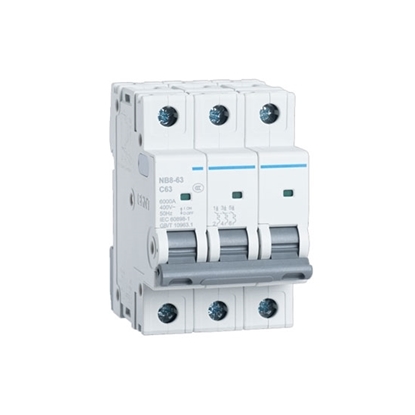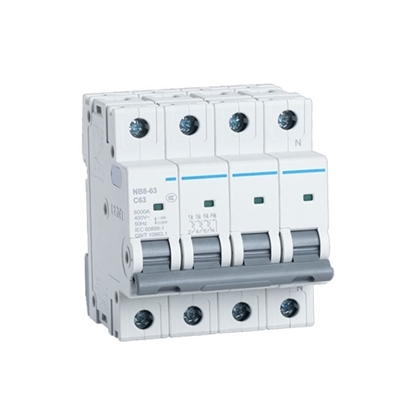Miniature Circuit Breaker
13 amp 3 pole Miniature Circuit Breaker
13 amp 4 pole Miniature Circuit Breaker
Miniature Circuit Breaker, also known as MCB, is one of the most commonly used terminal protection appliances in building electrical terminal distribution devices. It refers to a mechanical switching appliance that can make, carry, and break current under normal circuit conditions, and can also make, carry, and break current for a certain period under specified odd circuit conditions. It is used for single-phase and three-phase short circuits, overload, and overvoltage protection below 125A, including 1 pole, 2 pole, 3 pole, and 4 pole.
As an electrical switch, this mini circuit breaker is designed to protect an electrical circuit from damage caused by overcurrent/overload or short circuits. Its basic function is to interrupt current flow after protective relays detect a fault. A circuit breaker can make, carry, and break the current under standard circuit conditions. Hence it is called an on-load device.
This micro circuit breaker can be used as a protective device that can control the flow of the current just like a fuse. This is a benefit you might not expect from a switch disconnector. It breaks the circuit in case of fault conditions like short circuits and overloads. Unlike a switch, a circuit breaker automatically does this and shuts off the power immediately. In this way, it works as an automatic service protection device.
Miniature Circuit Breaker Working Principle
Miniature circuit breakers are composed of operating mechanisms, contacts, protection devices (various releases), and arc extinguishing systems. Its main contacts are manually operated or electrically closed. After the main contact is closed, the free trip mechanism locks the main contact in the closed position. The coil of the overcurrent release and the thermal element of the thermal release are connected in series with the main circuit, and the coil of the undervoltage release is connected in parallel with the power supply. When the circuit is short-circuited or severely overloaded, the armature of the overcurrent release is pulled in to make the free trip mechanism act, and the main contact disconnects the main circuit. When the circuit is overloaded, the thermal element of the thermal release will heat up and curve the bimetal, pushing the free release mechanism to act.
What Curve Trip Characteristics Does the MCB Have?
MCB is divided into A, B, C, and D curve trip characteristics.
- The A curve characteristic is generally used in applications that require fast and non-delayed tripping, that is, for a lower peak current value (usually 2-3 times the rated current/n) to limit the allowable short-circuit current value and the total breaking time. Therefore, MCBs can replace the fuse as overcurrent protection of electronic components and protection of mutual inductance measurement circuits.
- The B curve characteristic is generally used in applications that require faster tripping and the peak current is not very large. Compared with the A characteristic, the allowable peak current of the B characteristic is less than 3In, which is generally used for resistive loads such as incandescent lamps, electric heaters, etc.
- The C curve characteristic is generally suitable for most electrical circuits, which allows the load to pass a high short-term peak current without MCB action, and the C characteristic allows the peak current to pass <5In generally used for fluorescent lamps, high pressure gas discharge lamps, line protection of power distribution system.
- The D curve characteristic is generally suitable for switchgear with very high peak current (10In), and is used for the protection of primary circuits and solenoid valves of control transformers and local lighting transformers under AC rated voltage and frequency.
Frequency Use of MCB
The design and use of MCB is for the 50~60Hz AC power grid. Since the electromagnetic force of the magnetic release is related to the power frequency and operating current, when the MCB used under AC voltage is used for the protection of DC circuits or other power frequency occasions, the operating current of the magnetic release is different. Generally, it should be converted according to the magnetic tripping action current provided by the manufacturer and the coefficient of variation of the power supply frequency.
Ambient Temperature of MCB
The overload protection of the mini circuit breaker relies on the thermal release. Usually, the rated current of the thermal release of the MCB is set at the base temperature of 30℃. The working temperature of it is generally recommended to be -25℃~+55℃. The thermal release is composed of a bimetallic strip, which trips the MCB when the passing current reaches a certain set value and maintains it for a certain period. If the ambient temperature changes, the working temperature of the MCB will change, and the working characteristics of the thermal release will change accordingly. Since the miniature circuit breaker is usually installed in the distribution box, the ambient temperature cannot be kept constant at 30°C. Therefore, the actual working temperature of the MCB is always about 10C~15℃ higher than the ambient temperature. Generally speaking, when the ambient temperature is higher or lower than the correction value 10℃, the rated current value of the MCB must be reduced or increased by about 5%.
Selecting poles of Miniature Circuit Breaker
| 1P | Single pole switch of circuit breaker: Only one connecting plug, can only break one phase line, this switch is only suitable for controlling one-phase live wire. | ||||||
| 2P | Double pole switch of circuit breaker: Two connecting plugs, one is connected to the phase line, and the other is connected to the zero line. | ||||||
| 3P | 3 pole switch of circuit breaker: Three connecting plugs, which are connected to the live wires. This switch is suitable for controlling a three-phase 380V circuit. | ||||||
| 4P | 4 pole switch of circuit breaker: Four connecting plugs, three are connected to the live wires, and the remaining is connected to the zero line. This switch is suitable for controlling three-phase four-wire system circuit. | ||||||
| 1P+N | Single pole switch with zero terminal (the zero line doesn’t break) | ||||||
| 3P+N | 3 pole switch with zero terminal (the zero line doesn’t break) | ||||||
What are the Advantages of Miniature Circuit Breakers?
- After the fault is disconnected, MCB can be reset manually without replacing the components, unless it needs to be repaired after cutting off the large short-circuit current.
- It has two sections of protective functions, i.e., the long-time delay release with the inverse-time characteristics and instantaneous current release, which are used as overload and short-circuit protections respectively.
- Many breakers have intelligent characteristics. Besides protection, they also have functions like electric quantity measurement, fault recording, and communication interfaces to realize centralized monitoring and management of distribution devices and systems.
Filter by:
Clear All


